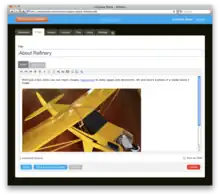Refinery CMS
Refinery CMS, often shortened to Refinery, is a free and open-source content management system written in Ruby as a Ruby on Rails web application with jQuery used as the JavaScript library. Refinery CMS supports Rails 3.2[3] and Rails 4.2 and Rails 5.1.
 | |
| Original author(s) | David Jones, Resolve Digital |
|---|---|
| Developer(s) | Philip Arndt, Uģis Ozols, Rob Yurkowski, Brice Sanchez |
| Initial release | May 2009 |
| Stable release | |
| Preview release | 4.1.0.dev
/ October 25, 2017 |
| Repository | github |
| Written in | Ruby |
| Platform | Ruby on Rails |
| Available in | Dansk, Deutsch, English, Español, Français, Italiano, Nederlands, Norwegian Bokmål, Português, Slovenian |
| Type | Content management system |
| License | MIT License[2] |
| Website | www |
Refinery differs from similar products by targeting a non-technical end user and allowing the developer to create a flexible website rapidly by staying as close as possible to the conventions of the Ruby on Rails framework.[4]
History
Refinery started as a closed sourced project written by David Jones at Resolve Digital in 2004[5] and went on to be released as open source software under the MIT License on 28 May 2009.[6] Since then it has, under the direction of Philip Arndt and Uģis Ozols, gained popularity[7] and is now the most popular Ruby on Rails CMS [8] with more than 384 contributors [9] and an active community extending the application with engines.[10]
Version 1.0.0 was released[11] on 28 May 2011 – exactly 2 years after it was first released as open source software.
Version 2.0.0 was released[12] on 29 February 2012.
Version 2.1.0 was released[13] on 5 August 2013.
Version 3.0.0 was released[14] on 19 September 2015.
Version 4.0.0 was released [15] on 29 September 2017.
Features
- Engine architecture
- WYSIWYG content editing
- Localisation (currently supports 29 languages [16])
- Page management
- Image and File management
- Contact form and inquiry management
- Search engine optimization (SEO)
References
- "The most popular Ruby on Rails CMS". refinerycms.com. Retrieved 2019-05-01.
- "Licence". GitHub. Retrieved 2010-07-08.
- Ruby Weekly (2012-03-01). "Ruby Weekly Issue 83 – March 1, 2012". Archived from the original on March 5, 2012. Retrieved 2012-03-01.
- "resolve's refinerycms at master". GitHub. Retrieved 2010-11-17.
- Patrick Morrow (2009-06-04). "RefineryCMS Goes Public". Archived from the original on August 12, 2011. Retrieved 2013-01-23.
- David Jones (2009-05-28). "First checkin – public release begins". GitHub. Retrieved 2010-07-08.
- Dan Benjamin and Jason Seifer (2010-01-21). The Ruby Show: Episode 104: Something New. Event occurs at 09:58. Archived from the original on 2010-09-22. Retrieved 2010-07-12.
{{cite AV media}}: CS1 maint: bot: original URL status unknown (link) - "The Ruby Toolbox – Content Management". Retrieved 2010-12-19.
- "Contributors to resolve/refinery – Github". GitHub. Retrieved 2010-12-19.
- "Engines – refinerycms – Github". GitHub. Retrieved 2010-11-18.
- "Refinery CMS 1.0 Released". Archived from the original on 2016-03-25. Retrieved 2010-05-28.
- "Refinery CMS 2.0 Released". Archived from the original on 2016-03-23. Retrieved 2012-02-29.
- "Refinery CMS 2.1.0 Released". Archived from the original on 2016-03-28. Retrieved 2013-09-16.
- "Refinery CMS 3.0.0 Released". Retrieved 2015-09-23.
- "Refinery CMS 4.0.0 Released with Rails 5.1 support – Refinery CMS". www.refinerycms.com. Retrieved 2017-11-18.
- Gregg Pollack and Nathaniel Bibler (2010-07-06). Episode #91 – July 6, 2010 (Flash). Event occurs at 01:54. Retrieved 2010-07-12.